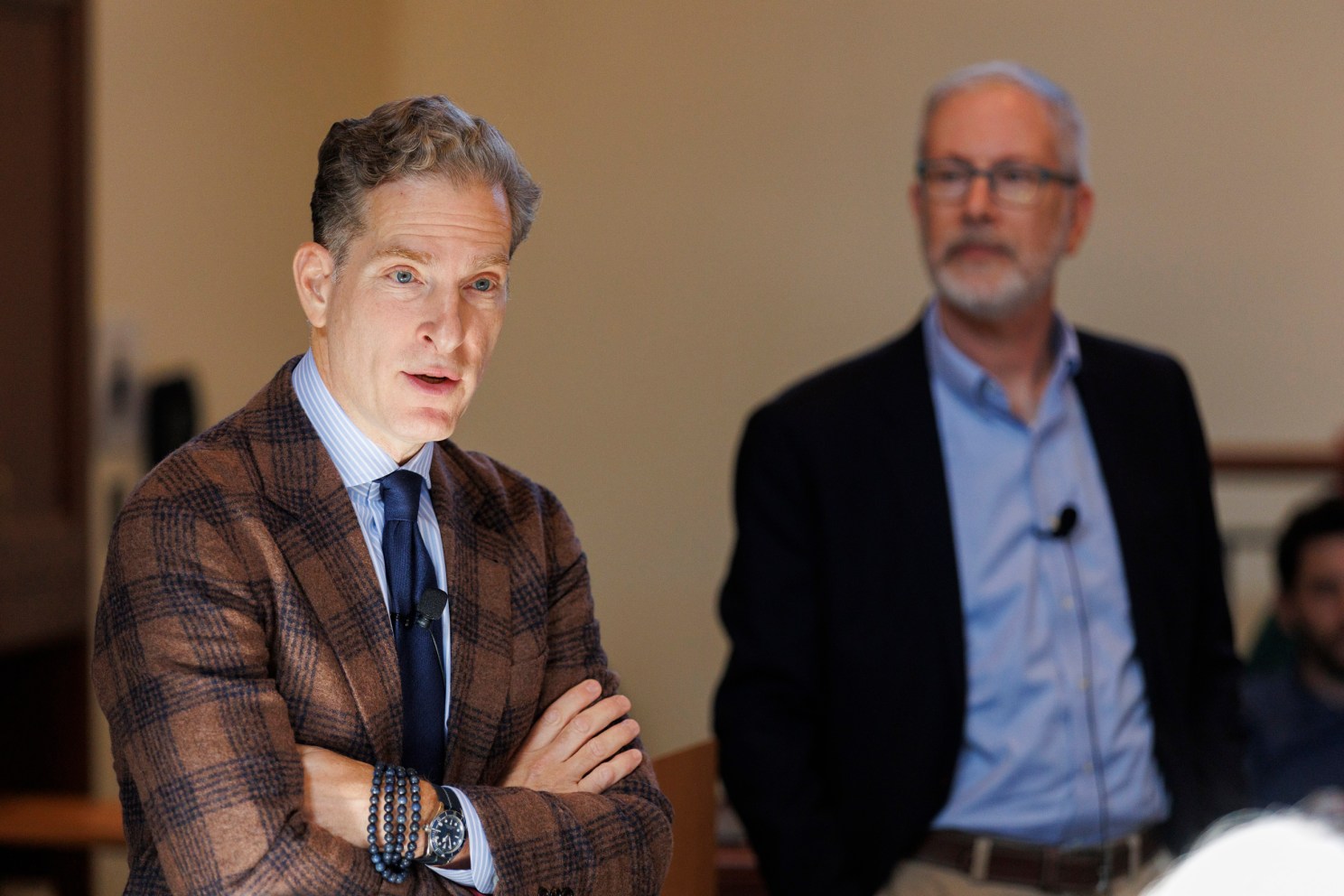
Noah Feldman (left) and Derek Penslar.
Stephanie Mitchell/Harvard Staff Photographer
Penslar, Feldman examine plight of Jewish Americans after 10/7 attack
Scholars trace history of group in U.S., discuss why many wrestling with what it means for Israel, their own place in nation’s culture
In the wake the Oct. 7 terrorist attacks and subsequent pro-Palestinian protests around the U.S., many Jewish Americans have been grappling with their own identities in relationship to Israel.
In a packed talk at Harvard Law School, Noah Feldman, the Felix Frankfurter Professor of Law, and Derek J. Penslar, William Lee Frost Professor of Jewish History, marked the anniversary of the Hamas-led massacre by detailing the historically close ties between American Jewry and the state of Israel today. In separate remarks, each underscored why the majority of Jews in the U.S. have felt profoundly betrayed over the past year.
Penslar, author of “Zionism: An Emotional State” (2023), also co-chairs the University’s Presidential Task Force on Combating Antisemitism and Anti-Israeli Bias. He began by outlining the historic processes that helped Jews integrate into American society and achieve a sense of political empowerment.
During the 19th century, Jews residing in North America and western Europe experienced increased economic mobility and social integration. Soon they were openly appealing for political interventions on behalf of persecuted Jews in North Africa and the Russian Empire.
During the 20th century, optimism took root among those living in the U.S. “Jews came to feel themselves to be not unusual or exceptional, but rather exemplary citizens of the republic,” said Penslar, who is also director of the Center for Jewish Studies. “And by that argument, antisemitism was not just bad for the Jews. It was bad for everybody. It was un-American.”
Among American Jews, the movement to create a Jewish state became widely popular during World War II as the Nazis murdered two thirds of the Jews in Europe. But American proponents departed from the tenets of Zionism’s central and eastern European founders, who stressed the importance for Jews to prepare for new lives in historic Palestine.
“American Zionism was not about moving to Israel,” Penslar said. “It was a Zionism that was fundamentally optimistic about Jewish life right here in the United States.”
This dual faith in the U.S. and the state of Israel underpins the betrayal experienced by many American Jews today. “They’re feeling more vulnerable than any time since the Second World War,” Penslar noted.
The reaction is especially acute among Jewish Americans on the left who saw their political allies justify the Hamas-led killings of 1,200 people in Israel, Penslar said. But for the majority of Jewish Americans, he added, “you see it largely in the way people are talking about what’s happening in the universities.”
For one, said Feldman, author of “To Be a Jew Today: A New Guide to God, Israel, and the Jewish People” (2024), the demonstrations were the opposite of the “post-9/11-style condemnation” that Jewish Americans had expected following Oct. 7. But they also represented a possible “ground shift” in political attitudes and moral discourse on Israel.
“The long process by which American Jewish identity came to be primarily bound up in Israel meant that for Jews to hear the view expressed that Israel’s very existence is morally problematic, or maybe wrongful, is sincerely experienced as antisemitic,” Feldman said.
As an additional consequence, Feldman argued that bipartisan support for Israel is now at stake.
“A core strategic accomplishment of the American Jewish community in its Zionism,” Feldman said, is ensuring the American political system’s support for Israel “no matter which party is in power.”
Evidence that a realignment is underway can be seen in Muslim American voters rejecting a staunchly pro-Israel President Joe Biden during Michigan’s Democratic primary last winter or in former President Donald Trump’s more recent appeals to Jewish voters as Israel’s “protector.”
“The big historical question of what did the spring’s conflicts and protests and encampments and responses mean, with a capital m,” Feldman said, “is really going to depend on what happens in November.”





